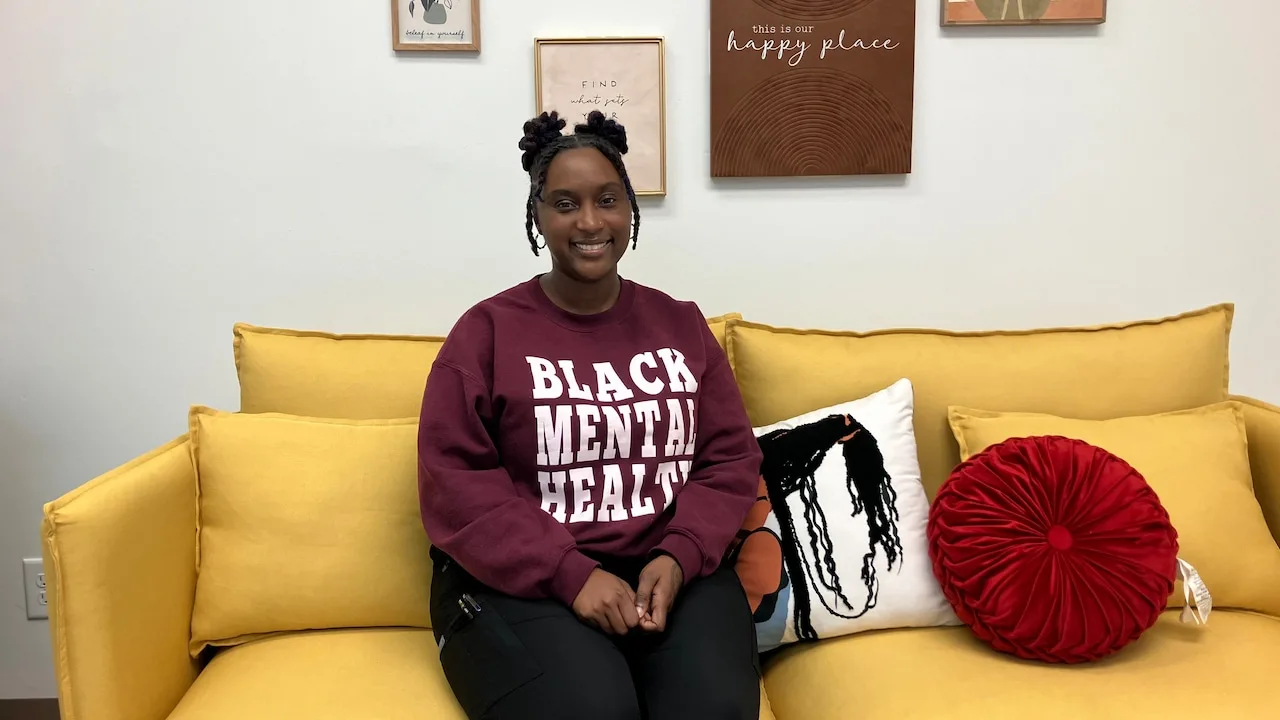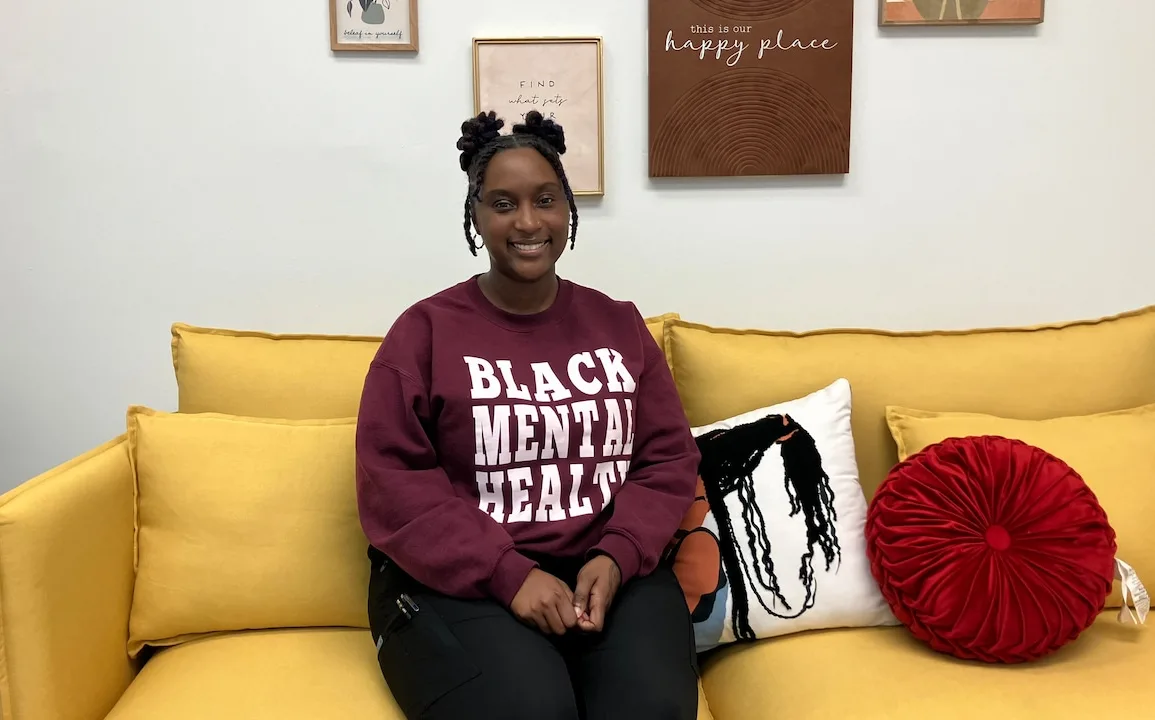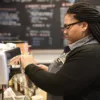
Adezza DuBose, a licensed counselor in Birmingham, sits behind her desk, her purple tipped locs tied into flower-like buns, notebook in hand, ready to listen to anyone in need.
Her laugh could put anyone at ease while sitting on her bright yellow couch. She feels familiar, like catching up with a cousin during the holidays or ranting with a friend after a hard day of work.
Alabama ranks 50th in access to mental health care, according to a 2022 Mental Health America study. Despite the stigmas surrounding mental health, Birmingham-based counselors and advocates are working to ensure underserved communities are receiving quality care. Black women mental health professionals in Birmingham hope to make positive changes by providing culturally competent care and resources.
“I want to be able to show my community that they have Black people out here in these spaces that were never designed for us,” DuBose said.
After graduating with her bachelor’s degree in sociology at the University of West Alabama, DuBose enrolled in the military in 2015 and served six years.
During that time, she gave birth to her daughter, worked as a mental health technician at a Tuscaloosa children’s center, founded Black Mental Health: Let’s Pray and Talk, an initiative to dispel mental health stigma in the Black community and earned her master’s degree in clinical mental health counseling.
“When I was in my master’s program, I was learning how counseling was geared more towards Caucasian people. In the same instance, I was learning how many Black communities were still against therapy due to [lack of] accessibility, the stigmas associated with it and how most of us were generally taught to keep things at home and just sweep it under the rug,” DuBose said.
Upon being discharged in 2021, DuBose became a therapist at Central Alabama Wellness Physicians where she began thinking about starting her own practice to help fill the gap of mental health access for the Black community.
“I just knew I wanted to help people,” DuBose said. “I just wanted to be able to talk to people, relate to people and be able to help them process whatever it is they have going on.”
While searching for the perfect place to start her practice, DuBose originally had her heart set on a brick and mortar in Hoover. But when her colleague showed her an available unit in a red brick building in Homewood, DuBose said she could imagine herself becoming a part of the community.
“I figured the Homewood location would be better because I could be closer to the people I really want to connect with clientele wise,” DuBose said. “I am really big on working with people of color and with Black people. That’s always been my thing, working with people in marginalized communities, because still to this day, unfortunately, a lot of Black people do not believe in the importance of mental health and seeking therapy.”
In January 2024 DuBose started her own practice, Iman Healing Journey, where she specializes in postpartum depression, anxiety, depression, post traumatic stress disorder and racial trauma. She offers a sliding scale fee based on her clients’ income.
“We have to consider different cultural approaches in counseling and what a [client] needs and feels is important to them because if we don’t, they will still feel like they’re not being heard. And in that case, what’s the point of therapy,” DuBose said. “I want my clients to feel seen. I want them to feel heard.”
Nadia Richardson, Black Women’s Mental Health Institute
Nadia Richardson, founder and CEO of the Black Women’s Mental Health Institute, a nonprofit dedicated to building support for Black women’s mental health and wellbeing, said she wants to move the needle for Alabama’s mental health.
The institute provides free counseling for all Alabamians, clinician training and community awareness for mental health equity, specifically for Black women, who, Richardson said, are too often overlooked and underserved in wellness spaces.
“I am someone who lives with a diagnosis. My diagnosis is high functioning Rapid Cycling Bipolar 2,” Richardson said. “For me, growing up, I didn’t always have the support that I needed because my family didn’t have insurance, they weren’t knowledgeable, nobody knew anything about mental health. It took years for me to accept Bipolar. I spent a lot of time not knowing and not having access to things and now I want to make sure people know and have access.”
While in graduate school earning her doctorate in higher education and administration from the University of Alabama at Birmingham, Richardson conducted research about the experiences of Black women with mental health concerns.
She learned that the stigma around mental health still needed to be dismantled. And she wanted to be the one to do it.
In 2015, Richardson started her organization under its original name, No More Martyrs, after Karyn Washington, 22, died by suicide. Washington was the founder of the blog For Brown Girls and discussed her mental health journey and celebrated self-love, particularly among dark skinned women.
“What I noticed in the comments of some of the articles about these notable Black women who committed suicide were people saying ‘they were selfish, and they were weak, and what did they have to be sad about, they were all educated, they were all beautiful, they all had jobs, they were all successful,’” Richardson said. “I felt like people just didn’t understand what mental health looked like. They didn’t understand that the words they were saying were stigmatizing.”
In her research, Richardson learned how Black women are often referred to as martyrs, as Washington was after her death. She initially named her organization No More Martyrs, and said she hopes her work will help prevent further loss and increase support for Black women.
With her team of four clinicians and counselors, the institute logs 200 hours of free counseling a month in almost 40 cities across the state.
“I don’t want [Alabama] to be 50th in mental health access. I don’t want that for us. I want to move the needle and be able to say that the Black Women’s Mental Health Institute is the reason for that,” Richardson said.
While Richardson hopes to increase equity for the Black community, the institute’s services are available to anyone in need.
“We believe it is very important that everyone is trained in cultural responsiveness and cultural competency,” Richarson said. “The lack of health equity, systemic racism, systemic sexism, the impact that that has on health and wellbeing is profound. We can learn from the various ways that mental health manifests itself across different races, and ethnicities and cultures.”
Tiffany Storey, Storeyhouse Counseling and Consulting
Tiffany Storey, licensed counselor and founder and executive director of Storeyhouse Counseling and Consulting, said she hangs culturally inclusive art along her office walls to put her clients at ease.
“I think if we’re not aware of people’s unique cultural experiences and challenges, we can cause them more harm,” Storey said. “We have to really show up for our clients in a way that makes them feel seen and valued and really able to consider the full context of their experience, it’s important to have people who have that shared experience.”
Storey started her practice in 2021. She has worked in the mental health field for 12 years conducting community mental health workshops, treating those with severe mental illness and providing transitional living, crisis intervention and emotional development resources.
“I very much feel like this is my purpose and was always headed in this direction,” Storey said. “I enrolled in school and ended up really loving mental health counseling and just realized this was my passion.”
On most days, one could find Storey filing paperwork, listening intently to a client during a counseling session and working with community organizations to increase mental health awareness.
Every Tuesday, Storey works as a mental health consultant with schools in Birmingham, supporting students through social emotional learning.
“I’m very much focused on communities that a lot of other clinicians may not go after,” Storey said. “Many clinicians are calling for private pay. Well, we’re in a recession. People are stressed out that the economy has changed a whole lot. And people genuinely need help, but they may not be able to afford to pay for it out of pocket.”
To provide services to more low-income Birmingham residents, Storey accepts Medicaid insurance, even though she is reimbursed for just half of her counseling fees.
“I think it’s important that we understand that people want to know that the person they’re talking to also very much understands on a personal level some of the unique challenges that they face within their culture, and within their community or in regards to mental health,” Storey said.



